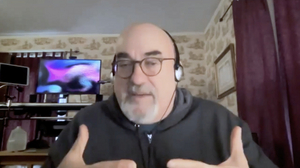THEATER: ALL THE MOVING PARTS to Feature Michael Starobin
Starobin, who recently won raves for his work on “Flying Over Sunset,” began orchestrating in 1981 on William Finn’s "March of the Falsettos".

In this new episode of "THEATER: All the Moving Parts," on CUNY TV, host Patrick Pacheco sits down with Michael Starobin, one of the top orchestrators on Broadway, winning Tony Awards for "Assassins" and "Next to Normal." He probably would have won for "Sunday in the Park with George," if the category had even existed in 1984. The show starts to stream on Monday, January 24 on https://bit.ly/3Aeull6.
Starobin, who recently won raves for his work on "Flying Over Sunset," began orchestrating in 1981 on William Finn's "March of the Falsettos," the Off-Broadway musical written and directed by James Lapine. Three years later, this acclaimed writer-director brought Starobin aboard for Stephen Sondheim's "Sunday in the Park with George," which began a long and fruitful relationship with the composer.
In this conversation, Starobin breaks down the obligations of the orchestrator, which is to divine and implement the intentions of the songwriters by adding thematic colorations to the score through the instruments at his disposal. Starobin says that he is foremost a story teller whose duty is to enhance and continue the emotional urgency of any scene by layering it with music that reflects the desired mood. Sometimes that works contrapuntally, such as the light and humorous touches he added to the songs in "Assassins," which recounts some of America's darkest periods. At the end of the interview, Starobin opines on the legacy of his friend, Stephen Sondheim. He says, "You cannot predict what someone's going to be in history. But I think there's a good chance that he will be the Shakespeare of the musical theater."
Patrick Pacheco says, "Broadway orchestrators could be called emotional manipulators of the audience or, at the least, emotional enablers of the actors. Starobin does this through the array of instruments, from four to forty, with which he helps to tell the story. I was struck that he called them his "company of actors," the mournful oboe, the brassiness of the trumpet, the cheerful flute. And leave it to him to cast against type if he feels that is what the scene calls for. He can even orchestrate an emotion as complex as irony."
"THEATER: All the Moving Parts" is a CUNY TV show, featuring in-depth interviews with top theater artists including playwright Theresa Rebeck, dramaturg Ken Cerniglia, intimacy director Claire Warden and choreographer Sergio Trujillo. Of Pacheco, Rebeck said, "I felt like I was being interviewed by someone who knows me better than I know myself." Go to THEATER: All the Moving Parts to see these and other episodes.
Patrick Pacheco is an Emmy-winning commentator and journalist whose work has appeared in The New York Times, The Los Angeles Times, The Wall Street Journal, Esquire.com, and many other periodicals. He wrote the 2009 Disney documentary "Waking Sleeping Beauty," and is the co-writer, with Maria Cassi, of the play, "My Life with Men...and other animals." He is the writer and editor of the Amazon best seller "American Theatre Wing, An Oral History: 100 Years, 100 Voices, 100 Million Miracles."
Michael Starobin is a well-known orchestrator and arranger working on Broadway and in Hollywood. He has been the orchestrator for some of Broadway's most innovative musicals such as Falsettos, Sunday in the Park with George, Assassins (2004 Tony Award for Best Orchestrations) and Next to Normal (2009 Tony Award for Best Orchestrations). He was the conductor and orchestrator for Disney's animated film The Hunchback of Notre Dame, orchestrated the songs for Tangled and contributed orchestrations to the film versions of Chicago, Nine, Beauty and the Beast (2017), Mary Poppins Returns and Tick, Tick... Boom!
Videos

